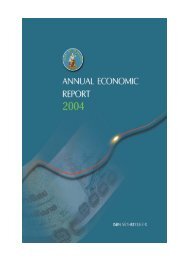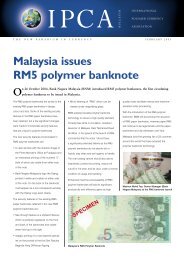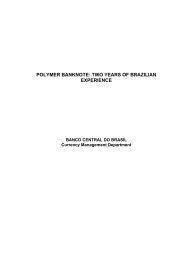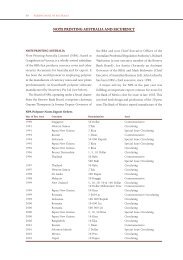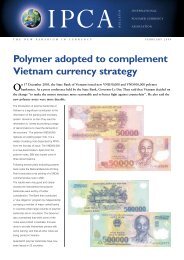ANNUAL REPORT 2008 - Polymer Bank Notes of the World
ANNUAL REPORT 2008 - Polymer Bank Notes of the World
ANNUAL REPORT 2008 - Polymer Bank Notes of the World
Create successful ePaper yourself
Turn your PDF publications into a flip-book with our unique Google optimized e-Paper software.
in <strong>the</strong> course <strong>of</strong> <strong>the</strong> year, in line with <strong>the</strong>tightening <strong>of</strong> financing conditions and weakereconomic activity.Overall, despite <strong>the</strong> clear deceleration ininflation rates from mid-<strong>2008</strong> onwards, averageannual HICP inflation in <strong>2008</strong> reached 3.3%,<strong>the</strong> highest level recorded since <strong>the</strong> introduction<strong>of</strong> <strong>the</strong> euro. This compared with rates <strong>of</strong> around2% in <strong>the</strong> preceding years. Notwithstandingsharp fluctuations in headline inflation rates, <strong>the</strong>ECB’s monetary policy succeeded in keepingmedium and long-term inflation expectationsfirmly anchored at levels broadly consistent withprice stability throughout <strong>2008</strong>. At <strong>the</strong> sametime, real GDP growth in <strong>the</strong> euro area slowedto 0.8% in <strong>2008</strong>, following solid growth rates <strong>of</strong>2.7% in 2007 and 3.0% in 2006. While economicgrowth in <strong>the</strong> euro area at <strong>the</strong> beginning <strong>of</strong> <strong>2008</strong>was relatively resilient, it deteriorated rapidlylater in <strong>the</strong> year in <strong>the</strong> face <strong>of</strong> a pronouncedslowdown in world economic activity.With regard to fiscal policy, <strong>the</strong> relativelyfavourable fiscal outcomes achieved in recentyears were reversed in <strong>2008</strong> as <strong>the</strong> financialcrisis unfolded and <strong>the</strong> macroeconomicenvironment deteriorated rapidly. Accordingto <strong>the</strong> European Commission’s interimforecast <strong>of</strong> January 2009, <strong>the</strong> averagegeneral government deficit in <strong>the</strong> euro areaincreased from 0.6% <strong>of</strong> GDP in 2007 to1.7% in <strong>2008</strong>, and it is expected to increaseconsiderably fur<strong>the</strong>r to 4.0% <strong>of</strong> GDP in 2009.In October <strong>2008</strong> euro area countries agreedon coordinated action to stabilise <strong>the</strong> bankingsystem, including <strong>the</strong> recapitalisation <strong>of</strong>financial institutions and guarantees for loansand deposits. In December <strong>2008</strong> <strong>the</strong> EuropeanCouncil approved a European EconomicRecovery Plan which is intended to supporteconomic recovery by streng<strong>the</strong>ning aggregatedemand and increasing efforts to implement<strong>the</strong> structural reforms envisaged by <strong>the</strong> Lisbonstrategy. The rising fiscal deficit and debtratios and <strong>the</strong> highly uncertain outlook poseconsiderable challenges for fiscal policy in<strong>the</strong> euro area. To support public confidence in<strong>the</strong> sustainability <strong>of</strong> public finances, a crediblecommitment to a path <strong>of</strong> consolidation inorder to return to sound fiscal positions, fullyrespecting <strong>the</strong> provisions <strong>of</strong> <strong>the</strong> Stability andGrowth Pact, is <strong>of</strong> <strong>the</strong> essence.Turning to structural policies, <strong>the</strong> ongoingweakness <strong>of</strong> economic activity and high levels<strong>of</strong> uncertainty about <strong>the</strong> economic outlookimply <strong>the</strong> need to streng<strong>the</strong>n <strong>the</strong> resilience <strong>of</strong><strong>the</strong> euro area economy. At <strong>the</strong> current juncture,it is essential to pursue economic policiesin line with <strong>the</strong> principle <strong>of</strong> an open marketeconomy with free competition, resisting anyprotectionist pressure. Moreover, productand services market reforms should fostercompetition. Labour market reforms shouldhelp to facilitate appropriate wage-setting,<strong>the</strong>reby protecting employment and fosteringlabour mobility across sectors and regions. Thiswill be particularly important for those areasand sectors hit strongly by <strong>the</strong> negative demandshock. In several countries, it is also crucial totake measures to address competitiveness lossesaccumulated over recent years.***Challenges in financial markets mountedconsiderably during <strong>2008</strong>. Euro moneymarkets continued to be characterised by highcredit spreads and very low trading volumes,notwithstanding <strong>the</strong> stabilising effect on <strong>the</strong>sevariables <strong>of</strong> <strong>the</strong> special measures which <strong>the</strong> ECBhad started to introduce in 2007 and extendedin <strong>2008</strong>. These measures mainly consisted <strong>of</strong>“frontloading” <strong>the</strong> liquidity provision to <strong>the</strong>banking sector within reserve maintenanceperiods, increasing <strong>the</strong> average maturity <strong>of</strong> <strong>the</strong>Eurosystem’s refinancing operations and, incooperation with <strong>the</strong> Federal Reserve System,providing liquidity in US dollars.As tensions across all money market segmentsand maturities intensified very significantlyin mid-September <strong>2008</strong>, <strong>the</strong> Eurosystemtook fur<strong>the</strong>r liquidity management measuresto ensure <strong>the</strong> continued ability <strong>of</strong> banks torefinance <strong>the</strong>mselves. In particular, a fixedrate tender procedure with full allotment wasECBAnnual Report<strong>2008</strong>11




![KNOW YOUR NEW GIBRALTAR BANKNOTES - [Home] bThe/b](https://img.yumpu.com/50890985/1/184x260/know-your-new-gibraltar-banknotes-home-bthe-b.jpg?quality=85)
![PAPUA NEW GUINEA - [Home] - Polymer Bank Notes of the World](https://img.yumpu.com/49758743/1/190x143/papua-new-guinea-home-polymer-bank-notes-of-the-world.jpg?quality=85)



